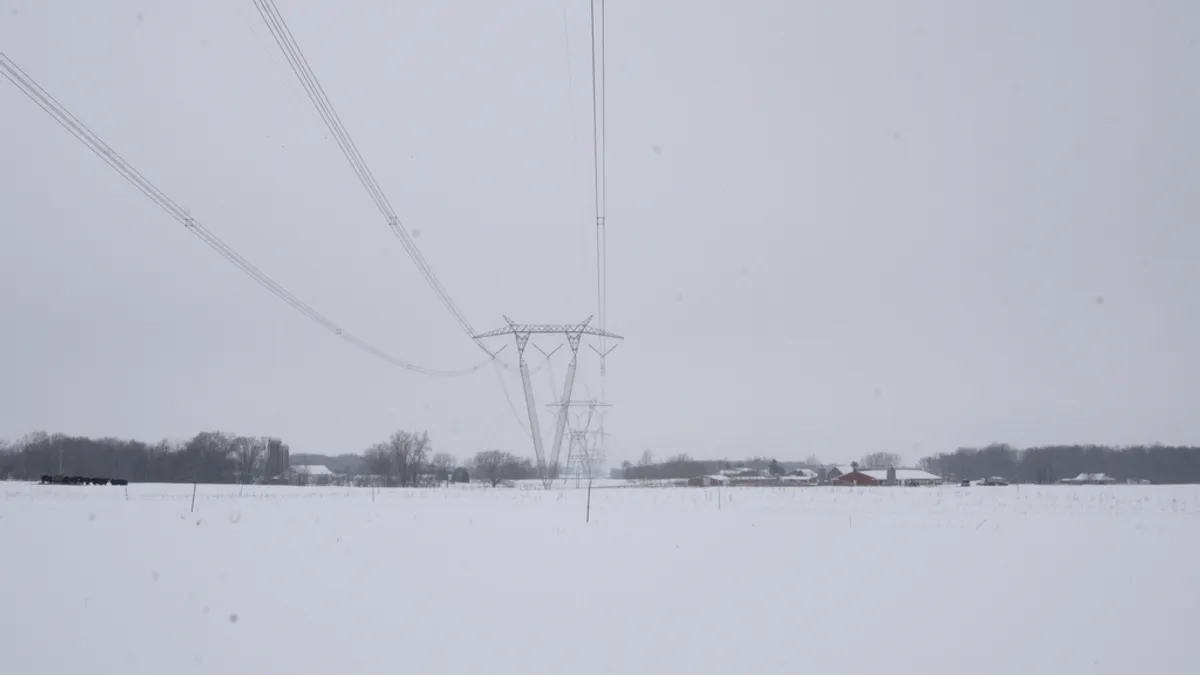Dive Brief:
- Almost half of the Electric Reliability Council of Texas' generation was forced offline at its peak during last week's power crisis that left millions without electricity for days, according to new data released by the grid operator.
- At its highest point, approximately 48.6% of ERCOT's power generation — 52,277 MW of the grid operator's 107,514 MW in installed capacity — was forced out due to the extreme weather conditions. This caused a critical supply shortage just as demand ramped up, and creating emergency conditions early Monday morning that forced the grid operator to initiate rolling outages throughout much of last week.
- The grid operator was dangerously close to succumbing to "a much more devastating situation," ERCOT President and CEO Bill Magness said while presenting the data Wednesday. Dangerously low frequencies could have plunged most of Texas into a multi-week black start event, he said.
Dive Insight:
Wednesday's presentation from ERCOT is the most detailed look yet the public has had of last week's devastating blackouts that impacted millions of people across Texas.
As early as November, ERCOT officials were warned that a cold snap could hit the south-central U.S. during the 2020/2021 winter season. In early February, the grid operator began issuing formal notices of incoming weather.
By 8:30 a.m. on Sunday, Feb. 14, ERCOT was calling for energy conservation — at 5:19 p.m. freezing precipitation forced transmission outages and by 7:06 p.m. ERCOT had hit a new winter peak of 69,222 MW — well above the 57,699 MW winter peak initially predicted by ERCOT in its September resource adequacy assessment.
Meanwhile, capacity reserves dipped below 3,000 MW, then 2,300 MW, then 1,750 MW throughout Sunday night and early Monday morning as extreme cold led to supply constraints. The rapid decrease in available generation caused frequency to reach a dangerously low 59.302 hertz — a safely operating system should sit around 60 hertz, and can't fall below 59.4 hertz for more than nine minutes, or else generation will start tripping offline and the grid operator risks blacking out the whole system, according to Wednesday's presentation. ERCOT sat at 59.3 hertz for four minutes and 23 seconds, before it began to shed load to bring critical system frequency back up.
"We could not stay there long, we could not go lower, or we would have risked a blackout of the entire system," said Magness. "And that is the thing that we cannot allow to happen, because if we have a blackout of the system, the system is out for an indeterminate amount of time and it's extraordinarily difficult to bring it back. We may still be here today talking about ‘When is the power going to come back on?' if we had let the system get into that condition."
Much of ERCOT's long-term outage issues were due to significant natural gas constraints, said Magness, who also cited other factors.
"Every effort was being made to fix those units," he said. "Some of them had fuel issues, and could not come back until those fuel issues were resolved. ... We saw a lot of fuel issues on the system." Further, icy conditions made it difficult for physical in-person repairs to happen, and prevented solar panels and wind turbines from functioning properly.
Many have compared last week's event to a similar coldsnap in 2011 that also took a significant number of generators offline. But side-by-side comparisons of the two events show the Texas grid was in a more precipitous position this time around.
At its peak in 2011, 14,702 MW of generation was pushed offline, and the lowest frequency was 59.58 hertz, according to Wednesday's presentation. Last week's event caused 356 generators in total to fall offline with a maximum load shed of 20,000 MW, versus 2011's 193 generators, and a maximum load shed of 4,000 MW. In total, the 2011 event lasted seven and a half hours, while last week's outages lasted over 70.
Still-remaining questions involve how generators and ratepayers will pay for the resulting price spikes — ERCOT reached its peak scarcity pricing cap of $9,000/MWh during the outages last week which sent customer bills skyrocketing and led the Public Utility Commission of Texas to freeze disconnections early this week. Now, retail providers are also concerned about getting stuck with those costs.
"Retailers simply cannot afford to pay artificially prolonged high wholesale prices, especially at the $9000/megawatt [hour] cap," said a representative from Just Energy during the ERCOT board call.
Wednesday's call marked the last for five of its board members, including its chair Sally Talberg — who previously served as chair of the Michigan Public Service Commission. The resignations became effective immediately after the meeting, Talberg said.
"We're here today, because we felt it was important to be part of the process to begin to evaluate what happened," she said. "With a thorough understanding of the causes and solutions and the right follow-through, I'm confident that Texas can lead the nation in investing in infrastructure emergency preparedness to withstand the devastating effects of severe weather in all seasons."















